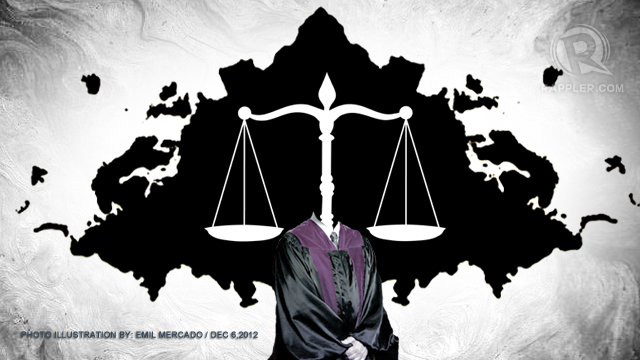SUMMARY
This is AI generated summarization, which may have errors. For context, always refer to the full article.

MANILA, Philippines – Can removing the psychological test as a requirement for contenders to the judiciary speed up the filling of vacancies?
The Judicial and Bar Council (JBC), the body that screens and vets aspirants to the judiciary, is studying a proposal to scrap the psychological test to comply with the objective of Chief Justice Maria Lourdes Sereno to expedite the selection of judges.
The JBC Office of Policy and Development Research said in a memorandum issued in October that the “psychiatric evaluation” has “become the bottleneck” in the processing of JBC applications and that it has not been an “effective screening tool in weeding out undesirable candidates” in the judiciary. The policy and development research office cited low ratios of failures in the psychological and psychiatric examination.
This is apparently the first time that the psychiatric evaluation has been cited as a reason for the delay in filling up vacancies in the judiciary. Usually, reasons mentioned include unattractive pay, lack of applicants (especially for posts in rural areas), and unaggressive recruitment by the JBC.
The requirement of psychological evaluation became controversial following leaked reports that Sereno and another contender to the post of chief justice, Solicitor General Francis Jardeleza, got a low score of 4 in the test.
Results of the psychological test range from 1-5, 1 being the highest and 5 the lowest; a score of 4 means there are more negatives than positives.
The Manila Times, in August, quoted from the supposed results of the report, which described Sereno as someone who “projects a happy mood but has depressive markers, too. There is a strong tendency to make decisions based on current mood thus outcome is highly subjective and self-righteous.” The JBC did not deny these results.
JBC members have denied though that Sereno wants the test removed. “She never raised that,” retired Court of Appeals Justice Aurora Lagman, who represents the JBC in the private sector, said. Sen. Francis Escudero, on the other hand, said Sereno “didn’t say that that’s what she wants.”
During the strategic planning session of the JBC on October 15, Sereno moderated the plenary session and asked for a review of the psychological test. In a separate session, a consultant from the Asian Institute of Management, where Sereno formerly worked, “broached the idea of removing the psychiatric examination,” a source privy to the deliberations said.
What the scores mean
The psychological test is one of the requirements that the JBC introduced in 2000.
Section 1, Rule 6 of the JBC Rules states: “Good physical health and sound mental/psychological and emotional condition of the applicant play a critical role in his capacity and capability to perform the delicate task of administering justice.”
The JBC has two in-house psychologists and two outsourced psychiatrists who conduct the psychometric and psychological tests. The test has a ranking system:
· 1 means the applicant is “clinically assessed as having a superior functioning in a wide range of activities.”
· 2- negative defenses are leveled out by positive qualities.
· 3- functioning may be compromised in an unusually difficult circumstance.
· 4-negative defenses are predominantly present.
· 5- presence of major impairments.
The failing grade is 5 but psychologists do not “generally recommend” those who got a 4.
The results of the test are confidential. Hence, it caused a stir when the results of Sereno’s and Jardeleza’s tests reached the media in August.
The JBC said that it was going to have the leak probed. JBC member Justice Secretary Leila de Lima said they may seek the assistance of NBI in determining how the leak happened. So far, the JBC has not found the source of the leak.
JBC members said though that Sereno, who got a 4, passed. Milagros Fernan Cayosa, who represents the Integrated Bar of the Philippines in the JBC, previously said that as long as the candidates have no psychosis, they will not be disqualified.
Is it still relevant?
Documents gathered by Rappler show that according to an evaluation conducted by the JBC Office of Policy Development and Research, applicants were disqualified due to failing the psychological test. However, the ratio is small.
In 2011, a total of 511 applicants took the psychometric test and 530 underwent psychological evaluation. Out of these, 4 got a score of 5 and were disqualified as applicants, or a ratio of .7%.
From January to September 2012, a total of 373 underwent psychometric testing while 370 took psychological tests. Again, 4 got the lowest score, which translates to 1%, and were disqualified.
The office said that since there is only a 1% mortality rate, the psychological test is not an “effective screening tool” even as it entailed a lot of time and resources.
It then recommended that since it is Sereno’s goal to reduce the vacancy rates, the psychological test should be “set aside for the meantime.”
Not everyone agreed with this, however.
Some JBC psychologists, in written comments, clarified that the .7% is not a ratio, but a percentage of those who failed the screening and hence is a figure that should not be dismissed. Having one appointee who is not psychologically sound is a cause of worry, they said, because he or she after all will be part of the judiciary.
They added that having a psychological test is not a cause of delay and that there are ways to hasten the process by decreasing the number of applicants.
The Office of the Policy and Development Research itself also came up with suggestions on speeding up and improving the process.
The office said that only those who get passing remarks on the following criteria—educational background, experience, performance, physical and mental health, integrity and other awards—should undergo the psychological test. If they fail in any of these, they will not be made to take the psychological test anymore.
Another recommendation is that only those who were nominated by the JBC should undergo the test, before the shortlist is submitted to the President.
Other countries like Austria, Hungry and the Netherlands also require those who aim to join the judiciary to take psychological tests. The UN’s Resource Guide on Strengthening Judicial Integrity and Capacity reported that in Austria, the tests do not result in a “pass” or “fail” remark, however. Lawyers in training for judgeship positions undergo group discussions and individual interviews as part of the psychological tests. The results are submitted to the Court of Appeals.
Floro talked to dwarves
The JBC has yet to act on the recommendation of the policy and research office. Lagman said though that the JBC psychological tests will definitely remain as a requirement.
“It is part of our rules,” she said.
An option, according to Mejia, is to allow contenders to just submit results of tests taken by their personal doctors to the JBC. “This is to give leeway to the applicants.”
The results were not as good as the last time this was allowed, however.
In 2006, the SC ordered the removal of Judge Florentino Floro of the regional trial court of Malabon, branch 73 because of a “medically disabling condition.” Floro talked to dwarves and said he can write while in a trance.
Floro failed the pyschological tests conducted by the JBC thrice: when he applied for a judgeship post in 1995 (he later withdrew his application) and again in 1998 and 2000.
In 1998, however, when he failed the psychological test, the JBC let him undergo psychological exams from a private practitioner. This despite the findings of JBC’s psychologists Beatriz Cruz and psychiatrist Celeste Vista that while Floro may have “impressive academic achievements” he has “lapses in judgment and may have problems with decision-making.”
They also concluded that “Atty. Floro’s current intelligence function is along the mild mental retardation (68) which is below the expected cognitive efficiency of a judge.”
Floro however passed the tests given by his private physician. In 1999, when the Office of the Court Administrator filed an administrative complaint against him, Floro was again required to take pyschological tests conducted by doctors from the SC clinic. He initially tried to have the psychologists from the SC clinic disqualified.
He also asked that he be allowed to take exams in another medical institution. The SC turned down this request. During the hearing on his case, the psychologists in private clinics who initially examined him eventually said they also found Floro psychologically unfit to be a judge.
Up to Sereno
But even as the JBC weighs in on the proposal to allow candidates to undergo psychological tests in private hospitals, it already put its foot down and said that it will use its authority to “disqualify applicants otherwise well-qualified who are proven to be mentally or physically incapable of discharging judicial functions.”
The JBC executive committee, composed of its regular members Lagman, Mejia, Cayosa and retired SC Justice Regino Hermosisima, proposed a point system for the assessment of candidates to the judiciary.
In the point system, good health (physical health, which could be assessed through medical certificate, impressions of laboratory, ECG and X-ray results; and mental health, measured through psychological exam) is worth 20 points.
Hermosisima said that even if good health is only equivalent to 20 points, it will disqualify applicants who are proven to be mentally or physically unfit in performing necessary tasks.
Sereno has yet to act on this proposal. – Rappler.com
Add a comment
How does this make you feel?





There are no comments yet. Add your comment to start the conversation.